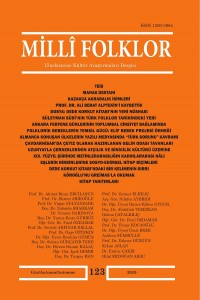Abstract
Social life is rewarding in terms of traditional entertainments which involve many elements as laugh, catering, music that enable people from the rush of daily life. Almost all regions have some specific inherent ways of entertainment. Entertainments in traditional societies are not independent from society’s world vision and historical memorial perception. Traditional entertainments tie relationships between society and ritual. The spirit of solidarity increases and the communication is strengthened in societies where identity and history are emphasized. Daily changes in today’s society reshapes the concept of entertainment and rituals. Generally, traditional entertainments and specifically “Ferfene Days”, collective concept of regions and all practices regarding the tradition have been considered a functional portion of cultural identity. In this study, Ankara Ferfeneleri, which is an Anatolian traditional entertainment, has been approached from functional perspective in terms of gender. In traditional entertainments, the diversity of appropriate actions which change according to gender are shaped pursuant to multi-variables such as economic situation, marital status, education level. That fact causes a distinction and stereotype within traditions. Potential causes of the differences regarding gender gap have been discussed in this study where appropriate. Traditional entertainment platforms are important in terms of female socialization and distribution of roles in society. Causes of gender discrimination in entertainment may be listed and based on social, economic, religious, and psychological factors. Hence the subject here has been examined based on social doctrine. Influence of importance, contribution, modification and transformation of traditional entertainments to traditional entertainments in terms of notion of culture and entertainment have been also embraced in this study. Nevertheless, ferfenes which have existed as multifunctional entertainment have been evaluated as causes for achievement of individuals, social solidarity, entertainment and learning on multi-layer basis from folkloric perspective.
References
- Aça, Mehmet ve Büyükokutan, Aslı. “Muğla Yöresi Kadın Merkezli Geleneksel Oyunların İşlevleri Üzerine Bir Değerlendirme”. Halk Kültüründe Eğlence Sempozyumu. (11 12- 13 Aralık 2009). İstanbul: Motif Akademi. (2011): 52-63.
- Akın, Bülent. “Kültürel Bellek ve Müzik”. Eurasian Journal of Music and Dance, (13), 101 117. EJMD / 2018 (13), 101-117, DOI: 10.31722/konservatuvardergisi. 496835.
- Assmann, Jan. Kültürel Bellek, Eski Yüksek Kültürlerde Yazı, Hatırlama ve Politik Kimlik. (çev. Ayşe Tekin). İstanbul: Ayrıntı Yayınları, 2001.
Abstract
References
- Aça, Mehmet ve Büyükokutan, Aslı. “Muğla Yöresi Kadın Merkezli Geleneksel Oyunların İşlevleri Üzerine Bir Değerlendirme”. Halk Kültüründe Eğlence Sempozyumu. (11 12- 13 Aralık 2009). İstanbul: Motif Akademi. (2011): 52-63.
- Akın, Bülent. “Kültürel Bellek ve Müzik”. Eurasian Journal of Music and Dance, (13), 101 117. EJMD / 2018 (13), 101-117, DOI: 10.31722/konservatuvardergisi. 496835.
- Assmann, Jan. Kültürel Bellek, Eski Yüksek Kültürlerde Yazı, Hatırlama ve Politik Kimlik. (çev. Ayşe Tekin). İstanbul: Ayrıntı Yayınları, 2001.
Details
| Primary Language | Turkish |
|---|---|
| Journal Section | RESEARCH ARTICLES |
| Authors | |
| Publication Date | September 29, 2019 |
| Published in Issue | Year 2019 Volume: 16 Issue: 123 |
Millî Folklor is licensed under a Attribution-NonCommercial 4.0 International license https://creativecommons.org/licenses/by-nc/4.0/


